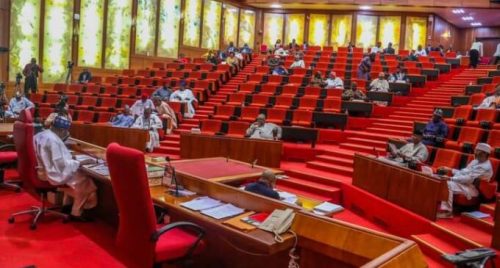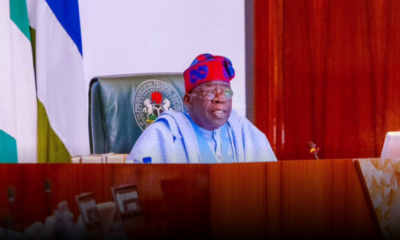The Senate has passed the electricity bill 2022 that would allow states to generate and distribute power as well as solve the sector’s challenges.
The bill was passed on Wednesday, after the consideration of a report by the senate committee on power.
Gabriel Suswam, chairman of the committee, said the bill sought to provide an ideal legal and institutional framework to leverage the modest gains of the privatization phase of the electric power sector in Nigeria.
Suswam said that it would minimize aggregate value chain losses in the sector when signed into law.
He also said there is no need for anyone or firm generating electricity below one megawatt to get a license, adding that the new law would allow states or individuals with capacities to generate their power.
“Since electricity is on the concurrent list in the constitution, the bill has allowed state governments to license people who intend to operate mini-grids within the states,” he said.
According to the lawmaker, the piece of legislation will reinvigorate the institutional framework for the reform of the Nigerian Electricity Supply Industry (NESI) initiated and implemented by the federal government.
Suswam also disclosed that the provisions of the bill sought to promote policies and regulatory measures that would ensure the expansion of power transmission networks in Nigeria to address any imbalance in the existing transmission infrastructure.
He noted that the bill would stimulate policy and regulatory measures to scale up efficient power generation, transmission, and distribution capabilities of the sector; as well as address technological limitations and outdated infrastructure responsible for value chain losses.
Ahmad Lawan, president of the senate, midway through consideration of the bill, sought to know the role and operational capacity of banks that had taken over Distribution Companies (DISCOs) indebted to them.
Responding, Suswam explained that the takeover of entities (DISCOs) by banks was duly carried out in collaboration with the Nigerian Electricity Regulatory Commission (NERC) and Bureau of Public Enterprise (BPE).
According to him, there is a transitional process put in place during the take-over of the Abuja Electricity Distribution Company (AEDC) by the United Bank for Africa (UBA) to ensure efficiency in service delivery.
He noted that such a process usually involved the invitation of new investors to scale up generation and distribution capacities.
Suswam further disclosed that the federal government had disbursed 100 million dollars to Siemens to kickstart transmission in the distribution end of the power sector.
On his part, Ahmad Babba-Kaita, senator representing Katsina north, said the faulty way in which DISCOs were created resulted in their inability to live up to expectations.
He, therefore, advised the federal government to ensure a transparent process in the selection of companies to take over power generation and distribution across the country.
Aliyu Sabi Abdullahi, deputy chief whip, noted that the aspect of renewable energy in the bill was given prominence amidst the energy mix.
The Electricity Bill, 2022, after a clause-by-clause consideration of the committee’s report by the committee of the whole, was passed by the upper chamber.
In his final remarks, Lawan said, “because of its importance and sensitivity, we will like to see a quick concurrence by the house of representatives.
“This is because time is of the essence as far as Nigeria is concerned when you talk about electricity and energy supplies in Nigeria.
“So, we will like to see that this bill is fully processed in the national assembly and sent to the executive arm of government for consideration and assent by the president.
“We believe that this piece of legislation can change the fortunes of the electricity industry in Nigeria for the better”.

 BIG STORY2 days ago
BIG STORY2 days ago
 BIG STORY4 days ago
BIG STORY4 days ago
 BIG STORY3 days ago
BIG STORY3 days ago
 BIG STORY4 days ago
BIG STORY4 days ago
 BIG STORY3 days ago
BIG STORY3 days ago
 BIG STORY2 days ago
BIG STORY2 days ago
 BIG STORY1 day ago
BIG STORY1 day ago
 BIG STORY8 hours ago
BIG STORY8 hours ago






















